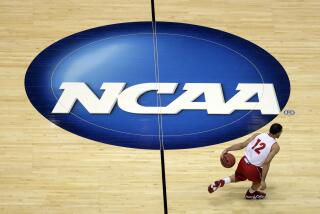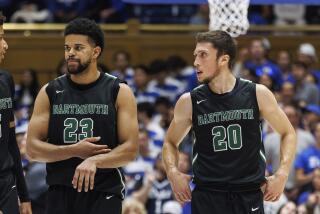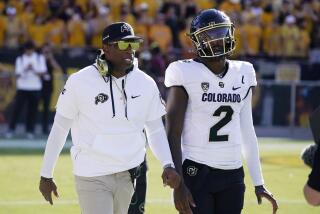Black Group Might Stage a Walkout : College basketball: Coaches would pull their teams to protest NCAA’s failure to increase scholarships.
- Share via
SAN ANTONIO — Black college basketball coaches might withhold their teams from competition as a means of showing their displeasure with NCAA convention delegates’ failure to restore a scholarship in men’s basketball, leaders of the Black Coaches Assn. said Tuesday.
“The BCA has definitely agreed that there will be some boycotts,” USC Coach George Raveling said Tuesday night after a three-hour conference call with members of the association’s executive committee. “There will be players involved. As to the when, where and how, we’re mot going to make any public statements on that.”
Rudy Washington, Drake University coach and executive director of the BCA, indicated in an interview with the Associated Press that white coaches might also participate and that the boycott might be open-ended.
“They are talking about the entire season, like the baseball strike,” he told the AP.
The failure of Division I representatives to approve legislation increasing the scholarship limit in men’s basketball from 13 to 14 has angered coaches and others who believe the decision will have a disproportionate effect on blacks.
College chief executive officers attending the convention fought the measure, saying it would signal a retreat on reform legislation initiated by the NCAA Presidents Commission.
The scholarship limit in men’s basketball has dropped from 15 in 1991 to 14 last year and to 13 this year as a result of the presidents’ cost-containment initiatives.
Raveling, Washington, Georgetown’s John Thompson and Temple’s John Chaney were among those who participated in the conference call to plan the BCA’s strategy.
Raveling said talks among association members would be ongoing and that “all creative ideas” were being considered.
Cedric Dempsey, NCAA executive director, declined to discuss the implications of such a boycott.
“If there is a boycott, what kind? How long?” he said. “We could play all kinds of speculative games, and I don’t think that would be productive at this point.”
Athletic administrators attending the NCAA convention were bracing, however, for a walkout on Saturday, Martin Luther King’s birthday.
“There’s real concern it could happen this weekend,” said Dennis Farrell, commissioner of the Big West Conference.
USC is scheduled to play at Washington State on Saturday.
Washington State Coach Kelvin Sampson told the News-Tribune of Tacoma: “There’s a possibility we’ll play, and a possibility we won’t. Something definitely will happen, but I don’t have an answer for you (as to) what it will be.”
UCLA Coach Jim Harrick, whose team is scheduled to play at Washington on Saturday, said he could not comment on a possible boycott because he had heard no details on the matter.
Tom Hansen, Pacific 10 Conference commissioner, said conference rules dictate that a team lose by forfeit if it fails to appear at tipoff. There is no rule to cover a situation in which both teams fail to show, Pac-10 officials said.
“It’s hard to say what we’d do (if both teams boycotted),” said David Price, Pac-10 associate commissioner.
Mike Garrett, USC athletic director, said he was unsure how he would handle a walkout by Raveling and his team.
“That’s a question I’m asking myself, and I don’t know the answer,” he said.
Garrett would not, however, support such action. He believes the convention sufficiently addressed the issue of blacks’ access to higher education when Division I representatives approved a resolution calling for further study of tougher academic requirements due to take effect in 1995.
“A little patience would go a long way right now,” he said.
Charles Harris, athletic director at Arizona State, offered a similar view.
“The significant issue here was the business of reviewing the academic issue,” he said. “The question of one scholarship is a minor component (in the access issue).”
Representatives of the BCA, NCAA and National Assn. of Basketball Coaches held discussions Tuesday in an effort to deal with the situation.
At the conclusion of the convention Tuesday afternoon, NCAA President Joseph Crowley issued a statement expressing the NCAA’s desire to continue working with the BCA to “address higher education’s moral obligation to provide young people in economically disadvantaged communities some hope and opportunity to participate in the American dream.”
Speaking at a news conference, Crowley, president of the University of Nevada, said he does not believe college presidents erred in branding a vote to add the basketball scholarship as a vote against reform.
“I certainly don’t want to second-guess what the Presidents Commission decided to do,” he said. “The problem is, the issue evolved into one with far greater symbolic significance than any of us could have predicted. It became a win-lose issue. . . . That became a fact of life. The issue had to be voted up or down based on points of view. And there was tremendous variance in those points of view.”
Asked if NCAA leaders had presented coaches with a specific proposal that could stop a walkout, Crowley said: “We’re not talking about a quid pro quo. We would hope that a boycott does not occur. But there is no package on the table.”
NCAA Notes
A four-member “research group” set up to study the feasibility of a Division I football playoff held its first meeting during the convention. NCAA Executive Director Cedric Dempsey, a member of the panel, said the group hopes to complete its report this spring. . . . Delegates approved legislation that will allow college basketball players to enter the NBA draft without losing their eligibility as long as they announce plans to remain in school within 30 days after the draft. The rule goes into effect immediately.
More to Read
Go beyond the scoreboard
Get the latest on L.A.'s teams in the daily Sports Report newsletter.
You may occasionally receive promotional content from the Los Angeles Times.










